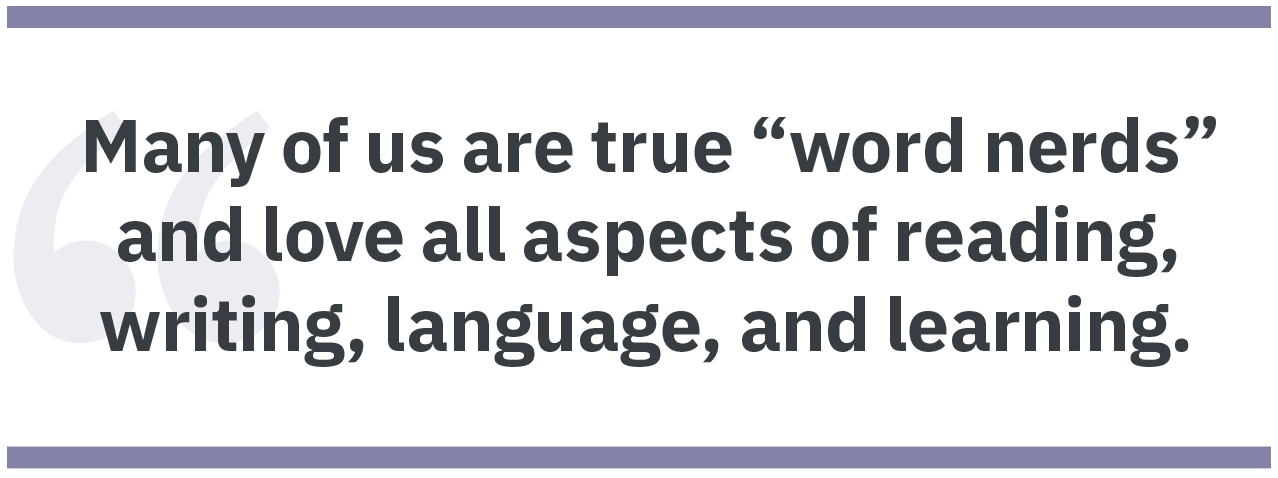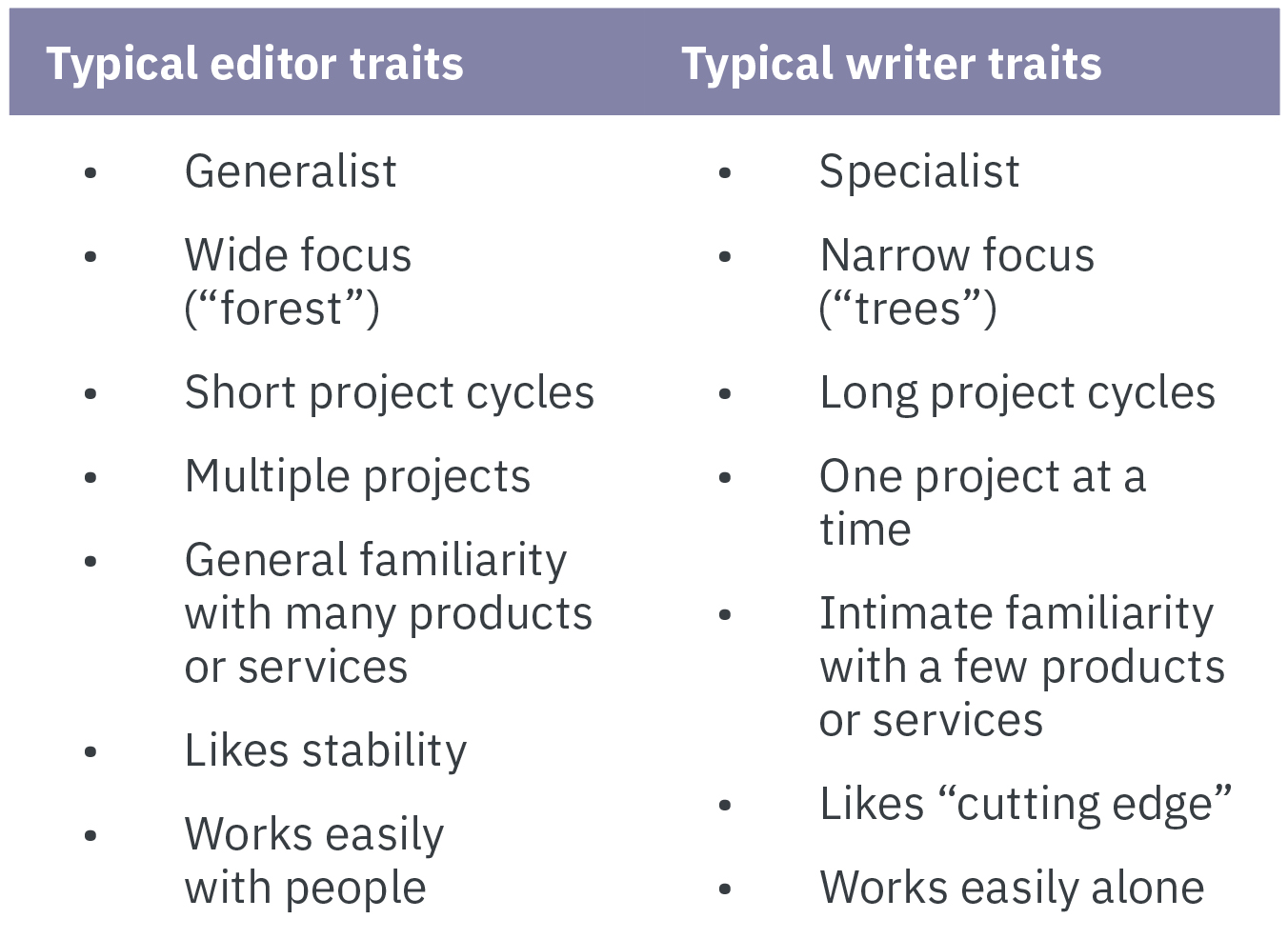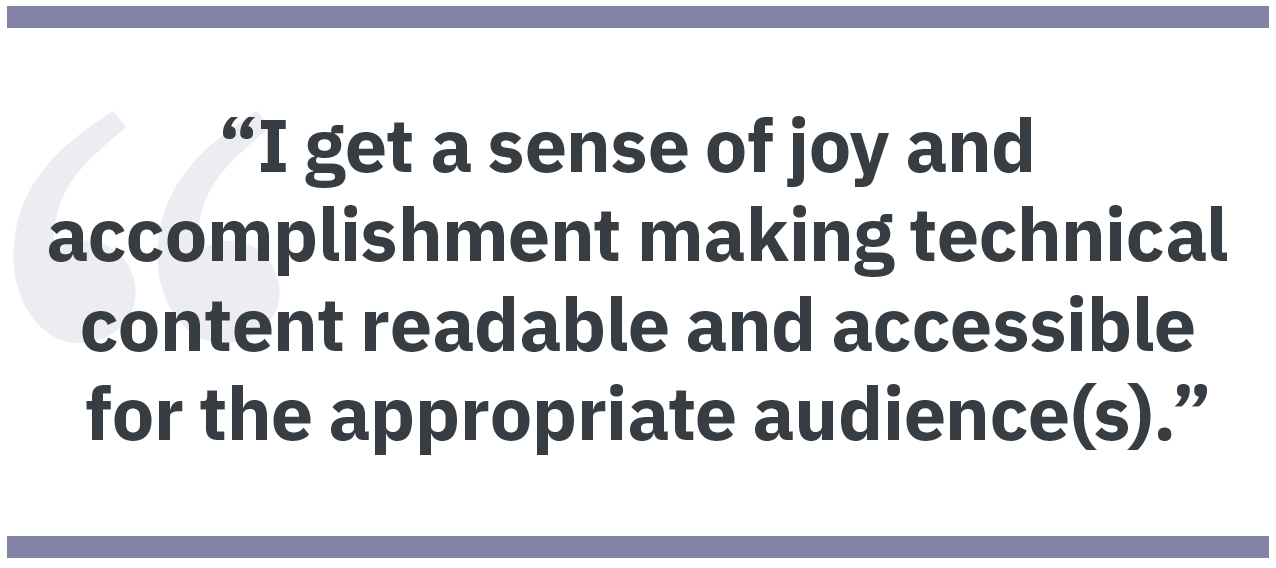By Linda Oestreich | Fellow
Education, passion, hard skills, soft skills: do you have what it takes to be a technical editor?
After spending almost a half century working in technical communications, I look back and realize that I edited more than I wrote. I had many titles at many different jobs over the years, but whether I was called a writer, an editor, a lead, or a manager, I edited. That means I’ve been a technical editor for a long time, making me qualified to share how I think you can become a technical editor. Let’s get started.
What is a Technical Editor?
A Google search for “technical editor” brought up a simple and succinct definition:
“Technical editors proofread, revise, and edit technical information in the work of technical writers. Technical editors will go over writing pieces for clarity, punctuation, grammar, and content. They may also write their own materials, design graphics and layout, maintain websites, and develop web content.” (Betterteam, n.d.)

The well-known, dog-eared, 12-year-old text, Technical Editing (Rude, 2011 ), offers the still-relevant definition: “Editors today are information designers. They often advise writers about the best choices for content, organization, and visual design. They are aware of audience and purpose—just as writers must be. They help prepare documents for publication, both in print and online. Basic copyediting, making the document correct and consistent, is just one of many editorial tasks.”
Any definition, whether current or old, incorporates most of what is included within these definitions. In short, as stated by Dr. Judy Glick-Smith, in response to a survey I recently distributed (Oestreich, Providing Information for Intercom Article on Becoming a Technical Editor, 2023): “Technical editors make technical communication better by ensuring consistency, accuracy, adherence to standards, and readability.”
Now that we’ve defined the job, let’s see what it takes to prepare for it.
How Can You Prepare to be a Technical Editor?
Traits
Technical editing, like technical writing, can have multiple entry points. A fairly consistent comment from those in the field is that most technical editors have at one time or another been a technical writer. It’s true that editors and writers often have “typical” traits, but the traits are flexible and many of us straddle the differences! Here’s a chart from a workshop of mine (Oestreich, Basically, It’s Technical Editing, 2021):

You don’t have to be wonderful at all of these, but most likely, if you become an editor, you’ll feel more comfortable with the list on the left.
Education Needs
Naturally, to be a technical editor, you need some education. The consensus among practicing technical writer/editors is that a 4-year degree is almost mandatory. Degrees in technical communication abound, and they can be your first choice if you know that’s your path. But if you take a more circuitous route, that 4-year degree can be in any field of study where you hope to edit such as science, information development, healthcare, or cybersecurity, combined with a college minor or a certificate in technical communications, English, or similar field. The combinations you put together are almost endless. My education was planned knowing that I was to be a technical writer/editor. At that time, my city had no technical communication degree programs. My counselors and I put together an English Literature major with two minors: Creative Writing and Scientific Perspectives (a unique minor of many basic science classes that taught concepts and terminology). That combo served me well throughout my career.
Passion
I also believe that you need talent and a strong passion for what you do. Many of us are true “word nerds” and love all aspects of reading, writing, language, and learning. If you embrace technical editing because you love doing it, you’ll excel. Ways to find out if it’s for you include writing and editing for newsletters, trade magazines, and anything else you can find. If you have a passion for a particular field, attend professional meetings, join LinkedIn, and find a way to network with those already in the field. All these things help you prepare to be a technical editor.
What Hard Skills Do You Need?
Hard skills are objective, quantifiable skills gained through training, school, or work experiences. Hard skills are things we often think of as tools and technology. Hard skills can change from industry to industry, team to team. Some companies and teams believe that a good editor only needs a strong foundation in writing and editing and the technology can be taught. Some believe that too much hard-skill knowledge gets in the way of the technical editor being a good representative of the client or reader. Others want those editors to have almost as much knowledge as their subject matter experts (SMEs). It depends.
In general, here are some hard skills that might be required to have a successful technical editing career. (Tarutz, 1992) (Oestreich, Providing Information for Intercom Article on Becoming a Technical Editor, 2023) (Murphy, 2010) :
- Excellent writing skills
- Information design
- Graphics art knowledge
- Project management skills & tools
- Time management skills
- Electronic publishing tools
- Editorial software
- Knowledge of MS Office and other writing tools
- Content development tools
- Hardcore understanding of mechanics and usage
- Tools and platforms used to house content at your company
- Knowledge of field in which you edit: terminology, basic concepts, etc.
- Change management tools
- Localization/globalization rules for content
- CMS/HTML coding
What Soft Skills Do You Need?
Soft skills are the types of things that are difficult to learn or change; they are the non-technical skills that describe how you work and interact with others. If you try to change a personality trait, you can, but it isn’t easy. Successful technical editors exhibit certain soft skills (some noted in previous chart) that can be honed and changed by practice, but some cannot. Here are some soft skills you might find useful. (Tarutz, 1992) (Oestreich, Providing Information for Intercom Article on Becoming a Technical Editor, 2023) (Murphy, 2010) They reflect the traits shown earlier in the comparison chart with writer traits.
- Listening
- Patience
- Attention to detail
- Kindness
- Excellent verbal skills
- Friendly demeanor
- Flexibility
- Able to maintain focus
- Multitasking ability
- Inquisitiveness
- Analytical thinking
- Decisiveness
- Negotiation skills
- Diplomacy & tack
- Quick learner
- Empathy
- Restraint
- Good judgment
- Adaptability
- Persuasion
- Superb sensitivity to language and communication
The list is long, but you get the idea. Technical editing seems more about working with people than it is about editing!
Does the World Need Technical Editors?
Now that you’ve looked at some areas about technical editing and still think you’d like to make it your career, an important question is: Will you be able to find work?
Companies’ Needs and Quality Assurance
You can read books, peruse texts, and become an STC Certified Professional Technical Communicator (Certification Overview: Validate Your Knowledge with Professional Certification) to enhance your resume and provide those hiring managers and human resources departments with reasons to hire you. But know that technical communication—writing and editing—is usually an ancillary aspect of a company. If the company builds widgets, having good documentation is part of that widget, but the documentation departments seldom get the credit they deserve.
That means you have to love what you do and continually prove that what you offer helps your company’s bottom line. Many articles have focused on the concept of quality assurance being a significant aspect of technical editing. (Corbin, 2002) (Oestreich, Technical Editing: the Foundation of a Quality Product, 2020) Showing how technical editing is quality assurance is a brilliant way to support your craft and convince your employers that what you do is directly related to success of the company.
Technical Editing Happens Everywhere
Another thing to realize about technical editing is that it’s a part of everything produced in technical communication. Just because you don’t have an official title of technical editor doesn’t mean you won’t edit! Writers edit their own work. Writers do peer editing. Documentation team leads edit work for their teams, and managers often fill in as editors for even larger groups. It’s unlikely that one would ever be part of a technical communication team and NOT have some responsibility for editing.
Saul Carliner created a recent survey and gathered data on our profession. (Carliner & Chen, 2019) In it, he asked the question “what is your current job role?” Out of 654 responses, 241 stated that they were writer/editors (the largest group). Only 23 said they were a dedicated editor. Those two categories made up about 40% of all respondents. If you add the 161 folks who identified themselves as writer only (because we know they also edit!), that percentage jumps to about 65%. Technical editing is a need that isn’t going away.
No matter if the person is a dedicated editor or not, the technical editor sometimes has the final word on how to clarify and fix a document. But, in reality, the SME or writer usually “owns” the document. That ownership comes with a responsibility to make decisions about when and what to edit. That’s why it’s so important for good editors to have excellent people skills: it’s the editor who must convince the SMEs/writers what’s most important to serve the audience. Editors must please not only the audience, but also the writers/SMEs of the work. Those folks must be convinced to make edits that can change the content and impact of a document, whether that document is on paper, on a computer, or on a webpage.
Wrap-up Words of Optimism
By now, you should have an idea if you want to be a technical editor and what you need to do if you’re not yet on that path. So far, we’ve looked at what technical editing is, the tools and technologies you need, the hard and soft skills required to do it well, its need in the workplace, and the future for the profession.

Let’s end with some words of optimism from folks who do it (Oestreich, Providing Information for Intercom Article on Becoming a Technical Editor, 2023):
- My job satisfaction was highest when I got to do technical editing. Technical editing let me bring my love of language (and words) and my innate curiosity together with my love of teaching (I was going to be an English teacher originally) [sic] together.
- I enjoy technical editing, especially if I can trust the content to be true and I have knowledgeable SMEs to work with. I get a sense of joy and accomplishment making technical content readable and accessible for the appropriate audience(s).
- I do enjoy technical editing, especially when working with SMEs who are NOT necessarily writers. I have had authors who have thanked me for making their work better, really appreciative of my help.
- I enjoy working with words that help people do their jobs better or inspire/empower them. I enjoy working with the details yet seeing the big picture.
And from one of our past giants, my own mentor, Lola Zook (past STC President and Fellow): “…editing is not just a technique for stating things more simply or more directly or more clearly, although that is often what it does. In skilled hands, editing is something done with sophistication and discrimination and grace.” (Zook, 1975)
As a technical editor, you, too, can strive for sophistication and discrimination and grace.
References
Betterteam. (n.d.). Retrieved from https://www.betterteam.com/technical-editor-job-description
Carliner, S., & Chen, Y. (2019). Who Technical Communicators Are: A Summary of Demographics, Backgrounds, and Employment”. Intercom .
Certification Overview: Validate Your Knowledge with Professional Certification. (n.d.). Retrieved from STC.org/certification/
Corbin, M. P. (2002). Technical Editing As Quality Assurance: Adding Value to Content. Technical Communication, 286-300.
Handbook, B. O. (2021). Summary page for Technical Writers . Retrieved from https://www.bls.gov/ooh/media-and-communication/technical-writers.htm
Murphy, A. (. (2010). New Perspectives on Technical Editing. Baywood Publishing Co.
Oestreich, L. (2020). Technical Editing: the Foundation of a Quality Product. Orange County STC.
Oestreich, L. (2021). Basically, It’s Technical Editing. STC Summit. virtual.
Oestreich, L. (2023). Providing Information for Intercom Article on Becoming a Technical Editor. Survey Monkey.
Rude, C. a. (2011 ). Technical Editing. Pearson Education, Inc.
Tarutz, J. (1992). Technical Editing. Hewlett-Packard Press.
Zook, L. M. (1975). Training the Editor: Skills are Not Enough. STC Anthology Series #4, Technical Editing: Principles And Practices.
 Linda Oestreich (lloriter@cox.net ) is a former (2007-2008) President of STC. Linda retired in 2018 from government service as senior technical writer/editor. Before working there, she worked in TechComm around California and Texas, in areas as diverse as HR, strategic development, software, IT, and oil and gas. Linda is a current instructor in the University of California, San Diego, Extended Studies’ Technical Communication Certificate program.
Linda Oestreich (lloriter@cox.net ) is a former (2007-2008) President of STC. Linda retired in 2018 from government service as senior technical writer/editor. Before working there, she worked in TechComm around California and Texas, in areas as diverse as HR, strategic development, software, IT, and oil and gas. Linda is a current instructor in the University of California, San Diego, Extended Studies’ Technical Communication Certificate program.


